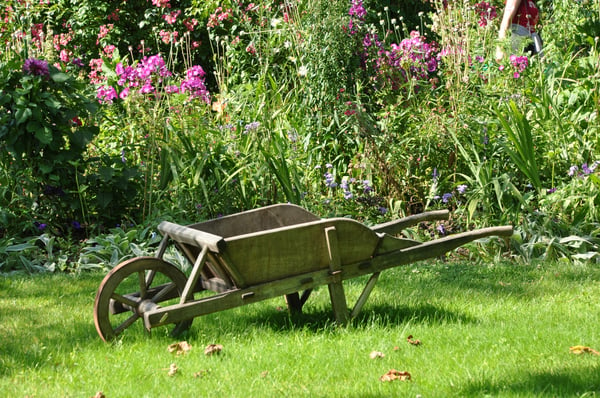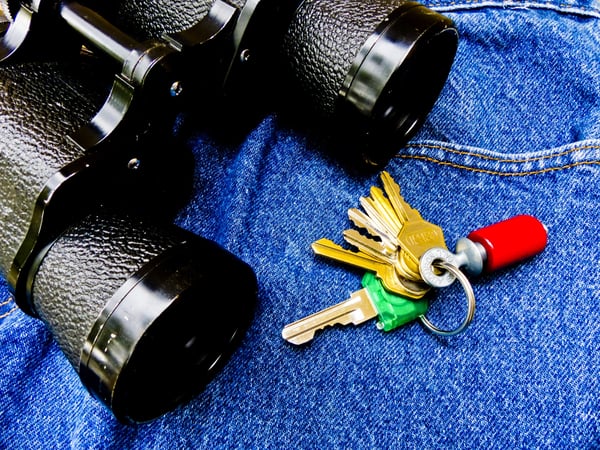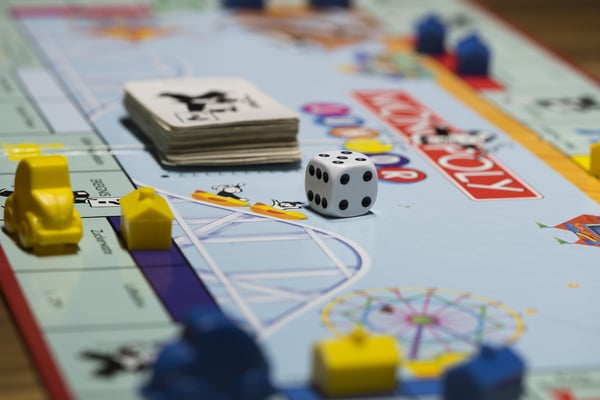
Everyone needs a hobby, and that's especially true for people with chronic diseases like COPD. Living with COPD can be stressful and difficult, and it's important to find activities you enjoy to brighten up your days.
Even though the symptoms of COPD can make some activities difficult, there are countless hobbies and activities you can still enjoy. Even if you suffer from severe shortness of breath, you can still find many fun ways to keep your body and mind active.
The best kinds of hobbies are those that stimulate your brain or get your body moving. It's also helpful to have a quiet, relaxing hobby for times when you need to unwind and de-stress.
In this article, we're going to look at a variety of different hobbies that are both COPD-friendly and good for your health. We'll give you ideas for activities to get you outdoors, to get you more active, and to help you cope with the anxiety and other emotional aspects of living with COPD.
Too many people with COPD get discouraged because of their disease and give up on many of the hobbies and activities they used to enjoy. We want to prove to you in this post that you can still enjoy a wide variety of fulfilling activities even with the limitations of COPD.
How Healthy Hobbies Can Improve COPD
Finding hobbies you enjoy is certainly a matter of fun, but it is also a matter of physical and mental health. Having regular hobbies can be a great way to improve your body's strength, your mental well-being, and even your COPD.
First, hobbies can help you take your mind off your disease and focus on the things in life that matter. It's important to not let COPD grind your life to a halt, and to continue enjoying the activities in life that make you happy.
Second, hobbies can help you get out of the house and have new experiences. They can help you meet new people and visit new places that you would never have experienced before.
Many COPD patients experience feelings of depression and isolation and avoid going out or seeing other people. But having a hobby away from home gives you something to look forward to and can help you find the motivation to leave your comfort zone and socialize.
Hobbies can also help you get more exercise and stay active, which is vital for staying healthy with COPD. Even if you dread physical activity because of your COPD symptoms, having a regular, active hobby can help you stick to your exercise goals and even make it fun.
Finally, hobby activities give you an opportunity to learn new things, practice new skills, and keep your mental faculties sharp. Hobbies can stimulate your brain and body by giving you new experiences and something positive to focus your mental energy on.
.jpg)
Picking up a new hobby isn't always easy, and it can take awhile to build the habits and skills that will help you see it through. That's why it's so important to find an activity that you actually enjoy and look forward to doing on a regular basis.
Here is a list of some of potential benefits that hobbies can have for people with COPD:
- Reduced anxiety and depression
- Decreased boredom
- Opportunities to get out of the house
- Opportunities to spend time outdoors and in nature
- Make physical activities and exercise fun
- Add enjoyment and interest to your days
- Opportunities for social interaction
- Opportunities to meet new people and have new experiences
- Provide a break from the stress and bustle of work and other responsibilities
- Personal discovery and improvement
- Help you cope with stress
- Help you structure your time
- Increased motivation
- Increased satisfaction with life
- Improved self-esteem
- Improved physical fitness and endurance
- Reduced feelings of isolation and loneliness
- Opportunities to build your knowledge and skills
- Opportunities for creativity and exploration
Is it Safe to Have Active Hobbies with COPD?
It's important to realize that exercising and participating in hobbies is not only possible, but very healthy, even if you suffer from severe COPD. You shouldn't let breathlessness and other COPD symptoms stop you from doing the things that keep you healthy and happy.
While you may have some difficulties because of your disease, it is still perfectly healthy to exercise, go out, and enjoy life. While it's important to know your limitations, don't let your disease hold you back from living an active and fulfilling life.
If you are worried about how a new hobby or activity may affect your disease, don't hesitate to talk to your doctor. You doctor can tell you what kinds of activities are safe and even give you tips for managing your symptoms in different situations.
When you do anything active, always listen to your body and take as many breaks and rests as you need to keep your breathing under control. Take the time to stretch and warm up before doing something physical and keep your rescue medicine with you at all times.
If you do a hobby outdoors, it's important to be cautious about where and when you go outside. On certain days and in certain places, the outdoor air may be full of respiratory irritants that can make your COPD worse.
Things like smog, pollen, dust, and even extreme temperatures and humidity can make it harder to breathe and even trigger a COPD exacerbation. You are also more likely to get exposed to dust and smog near construction sites, busy roadways, and dense urban areas.
To make sure the air outside is safe for your lungs, take the time to check your local air pollution, weather, and allergy forecasts before planning activities outdoors. When the air quality is poor or the weather conditions are extreme, keep your lungs healthy by staying indoors and waiting until conditions improve.
If you are experiencing or getting over a COPD exacerbation, you may need to put off physical or outdoor activities until you recover completely. If you follow your COPD action plan and take it easy when you're symptoms flare-up, then you'll sooner get better and be able to return to your normal routine.
Overall, most hobbies are safe to do as long as you take basic precautions and don't push your body too hard. There's no reason to let your COPD limit your life any more than necessary, and there's every reason to enjoy life to the fullest.
The Best Hobbies for COPD
Because of your disease, you may have limited mobility or struggle to do physical activities for long periods of time. That's why, in this article, we've tried our best to only include activities that are light and easy for people with limited strength and endurance to do.
At the same time, we've tried to choose a variety of different hobbies to suit a variety of different tastes and activity levels. However, we've still stuck with hobbies that are oxygen-friendly and less likely to make you feel short of breath.
In the next sections, we'll explore a diverse set of healthy, COPD-friendly activities to help you find a hobby that works for you. We've even included a variety of tips and tricks for getting started and for making tasks easier when you struggle with breathlessness and fatigue.
If you are looking for ways to improve your life with COPD, take some time to look through and learn more about the hobbies listed below. It can be encouraging to see the wide variety of options you have and to know how they can improve your life.
For the sake of this article, we're going to split hobbies into three main groups: outdoor hobbies, indoor hobbies, and hobbies that relax or stimulate your brain. While this is not an exhaustive list, it may give you the inspiration and motivation you need to find another fulfilling hobby that works for you.
Outdoor Hobby Activities for COPD
There's something that's deeply refreshing about getting fresh air and spending time outdoors. In fact, studies show that being outdoors can reduce anxiety, boost creativity, and even improve your concentration.
However, some people with COPD find it difficult to motivate themselves to go outside. Because of COPD symptoms, depression, or simply the stresses of everyday life, many COPD patients end up avoiding activities that take effort or require leaving their homes.
However, getting outdoors is important for both your physical and mental health. It's gives you the opportunity to be more active, experience the tranquility of nature, and take a break from the confines of daily life.
Sunlight is also the best source of vitamin D, which is an important nutrient for your bones and for your mental well-being. And, because people with COPD are disproportionately affected by bone problems like osteoporosis, it's especially important to get enough vitamin D to keep your bones healthy and strong.
That's why it's so beneficial to have a hobby that gets you out of your house and into the sun. Even if you tend to avoid the outdoors, you'll feel much more motivated to get out when you have a fun activity to look forward to and a reason to go outside.
Many outdoor hobbies are also sources of exercise that can help you keep your body strong and toned. If you're looking to increase your physical activity, there are a variety of fun hobbies that will help you get light to moderate levels of exercise outdoors.
As the writer and conservationist John Burroughs wrote, "I go to nature to be soothed and healed, and to have my senses put in order." No matter how you do it, spending time outside and in nature will help you live a more full and meaningful life with COPD.
Walking

Activity Level: Light
Oxygen Therapy-Friendly: Yes
Walking is a wonderful activity for people with COPD because it is light, steady, and slow-paced, while still getting your heart rate up. It helps strengthen your heart, your skeletal muscles and the muscles you use to breathe.
Walking is a great way to ease into exercise and practice controlling your breathing as you work out. It is relatively easy to time your breathes with your steps as you walk, and you can slow down or take breaks as often as you need to.
If walking sounds boring at first, just think about all of the amazing sights you could see while out on a stroll. You could see new people, new places, and even spot birds and wildlife just about anywhere you go.
You can spice up your walks by leaving your neighborhood for a stroll around a local park, shopping area, waterway or hiking trail. If the weather is too hot, too cold, or you just need a change of pace, you could even take a walk in a large indoor place like a convention center or mall.
Walking is not only a great way to get exercise and improve your physical health, but it's a great opportunity to get outside and reconnect with nature. You can take long walks to get away from the bustle of modern life for awhile, or take short, quick walks during the day to clear your head and get some fresh air.
Wherever you go, walking is bound to improve your physical endurance and may even help you improve your shortness of breath when you do other light activities. It also gives you a reason to get out of the house and spend some time in the sun.
Golfing

Activity Level: Light
Oxygen Therapy-Friendly: Yes
Golfing is a fantastic sport for relaxing and enjoying the outdoors if you have COPD. It also gives you the opportunity for some light physical activity through walking, swinging, and spending time on your feet.
Golfing is also oxygen therapy-friendly, since it's usually simple to tote your oxygen along with your other supplies. Using a golf cart also means you won't have to wheel your oxygen tank too far, although using a portable oxygen concentrator would be even more convenient.
The main downsides to golfing are that games can be long, the weather can be hot, and it can be pricey to play. If you cannot afford to rent or buy the supplies, or if being in the sun all day worsens your symptoms, you might be better off finding a less expensive or less lengthy outdoor hobby to enjoy.
Gardening

Activity Level: Light
Oxygen Therapy-Friendly: Yes
While gardening isn't for everyone, it's a great way to spend time outside without ever having to go far from home. It's relaxing, fun, tactile, and allows you to enjoy nature in a close and intimate way.
Even if you don't have a green thumb, gardening is a great way to learn more about plants and get some practice keeping them alive. Even though there are always struggles, there is something unique and magical about the experience of growing living plants and bringing seeds to life.
Working in the garden is also a great way to get some extra exercise while getting to play in the dirt. Between planting, weeding, digging, and watering, there are plenty of opportunities for light cardio and strength-building tasks.
If you have trouble kneeling and crouching, you can use garden knee pads or stools to make planting and weeding more comfortable. It is also much easier to garden in raised beds, which are easier to reach and provide a variety of benefits for plants.
One of the best things about gardening is enjoying the fruits of your labor, whether it's fresh veggies and herbs to eat or simply beautifying your home. Bringing beautiful plants and blooms to life is a reward in and of itself, whatever kind of gardening you do.

You don't even need a large yard or space to start your own garden; just a small garden bed, raised bed, or even some large pots will do. There are countless resources online about small space gardening for people with little or no lawn space, such as apartment and urban city dwellers.
There are many different ways to plan a garden, and what you choose will depend on your individual plant preferences and the space you have to work with. You could even cultivate an indoor garden if you have enough sunny window space or don't mind investing in indoor grow lights and other supplies.
Here is a variety of ideas for different types of gardening you could try as a new hobby:
- Plant a classic vegetable and herb garden
- Try square-foot gardening for the best yield in small spaces
- Use a raised bed to allow easier access and a healthier environment for your plants
- Start a window box or container herb garden
- Built a succulent plant collection
- Try container gardening and grow all your plants in indoor or outdoor pots and containers
- Learn the art of raising bonsai trees
- Join a community garden in your local area
- Take a gardening class at your local library or community center
Fishing

Activity Level: Very Light
Oxygen Therapy-Friendly: Yes
Fishing is a slow-paced, yet delightful activity and a satisfying way to spend extended amounts of time outdoors. It's also a great opportunity to get out of your house and away from all the technology and distractions of modern life.
Unlike outdoor activities that you do in your own neighborhood or backyard, fishing gives you the opportunity to delve a little deeper into nature. It's a great excuse to explore your local parks and waterways or travel to far-away lakes and reservoirs on more distant fishing trips.
Fishing is also great for people with COPD who have severe symptoms or limited strength and mobility. While it usually requires a bit of walking, it is overall an extremely light and easy activity to do.
Fishing is also oxygen-friendly, as long as you have a sufficiently portable oxygen device or go to an easily-accessible stretch of water. You can also reduce the difficulty of hauling bait and supplies by enlisting a friend to help or using a wheeled container to carry your things.
Just make sure you pack light and take plenty of water along with you to avoid dehydration. If you use supplemental oxygen, it's also a good idea to stay on dry land to protect your equipment and ensure you can quickly go and get help if needed.
Fishing is relatively inexpensive once you have the right supplies, although you may need to pay for a permit or pass to fish in some places. With any luck, however, you'll have dinner covered by the fish you catch by the end of the day!
Bird Watching

Activity Level: Light
Oxygen Therapy-Friendly: Yes
Bird watching, or “birding” as it is affectionately called by avid hobbyists, is an incredibly simple, yet fascinating hobby. It's a wildly popular activity; at least 85 million people in the US participate in some sort of bird watching, and all you need is a field guide to get started.
Birding is a great hobby for people with COPD because it is light, relaxing, and totally oxygen-friendly. You can enjoy bird watching while standing, hiking, or sitting completely still, and you can choose your activity level based on your personal goals, symptoms, and how you feel on a particular day.
Birding is also relatively inexpensive; while you may need to spend about $100 on a pair of binoculars to start, it's a one-time purchase that can last you a lifetime (and they're not strictly necessary if you don't have the funds). The rest you can get for free, including bird identification field guides, which you can rent from your local library, and the bird-viewing areas themselves.

One of the best things about birding is that you can do it just about anywhere; at the park, outside your grocery store, and even in your own backyard. It's such a convenient and versatile hobby that you don't even have to go outside or carve out a dedicated time to do it. You can enjoy the pleasure of watching birds from your car, bus, train, or out your home or office window.
To delve deeper into nature and see a greater variety of birds, you can visit public parks, waterways, hiking trails, and nature reserves. You can bird watch alone in your own spare time or you can join a bird-watching club. If there are none in your area, you can always start up a small birding group of your own.
If you are interested in birds or simply curious to know more about the critters that live around you, then bird-watching may be the perfect hobby for you. It's a great way to get outdoors and get some light exercise while learning more about nature and your local environment.
Indoor Hobby Activities for COPD

While it's great to have hobbies that get you up and outdoors, it's also important to have an indoor hobby that you can do at home. Indoor hobbies are great for days when you're not feeling well or just feel like spending some time at home.
Indoor hobbies also give you something to do when going outside is unpleasant or unwise. When it's too hot, too cold, too humid, too polluted, or when pollen or humidity levels are high, you'll be glad when you have a hobby that you can enjoy inside.
Reading

Activity Level: None
Oxygen Therapy-Friendly: Yes
Reading is something that many people do in their younger days but lose touch with as they get older. As the stress and bustle of life press down, simple pleasures like reading often get set aside and forgotten.
However, reading is one of the easiest, cheapest, and most convenient hobbies to pick up. You can do it anytime, anywhere, and you can spend as much or little time reading in a single sitting as you want.
Another benefit of reading is that it is 100 percent supplemental oxygen-friendly and requires no physical exertion at all. It's also keeps your mind sharp; studies show that reading can improve memory and reduce mental decline in elderly adults.
One of the great things about books is that there are so many kinds, and anyone can find a book on a topic they enjoy. Whether you're passionate about science, history, nature, gaming, language, fantasy, science-fiction, or literally anything else, you can find a great book that you'll look forward to reading after every time you put it down.
Reading can help you learn new things, experience new perspectives, and build your language and literary skills. It's also a wonderful way to take a break from the stresses of life and quiet your mind before you go to bed.
If you are not sure where to start, you can get some ideas for new books by browsing some of the featured titles and editor's picks in your local book store or library. You can also find great book recommendations, reviews, and themed book lists on websites like Goodreads.
Scrapbooking

Activity Level: Very Light
Oxygen Therapy-Friendly: Yes
If you're looking for a relaxing, creative activity that you can do any time of year, then you should consider taking up scrapbooking. After all, what else are you going to do with all the photos and memorabilia you've collected throughout the years?
Scrapbooking is a great opportunity to slow down, revisit old memories, and share precious moments with family friends. It may even help you find the motivation to finally print out all the digital photos you love.
In many ways, making a scrapbook helps you organize your clutter into something beautiful that you can cherish. It's also an opportunity to free up some space around the house by using up miscellaneous crafts and supplies.
Although some people take scrapbooking very seriously as a special kind of art, you can make the hobby as casual or complicated for yourself as you'd like. Whether you're a detailed, creative type, or you just want to a place to collect and display your memories, scrapbooking can be a fun, relaxing, and rewarding activity to do in your free time.
Journaling

Activity Level: Very Light
Oxygen Therapy-Friendly: Yes
You don't have to be an avid reader or writer to keep a personal journal. Anyone can do it, and studies show that journaling on a regular basis can have a huge, positive impact on your mood and mental well-being.
It only takes about 5-10 minutes a day to reap the psychological benefits of journaling, and you'll find that it can be a deeply fulfilling hobby once you get in the habit. Writing down your thoughts is a great creative outlet and a great way to work through problems, worries, and fears.
Journaling every day can help you get to know yourself and your inner thoughts and make sense of your experiences and emotions. It's also a great way to get some quiet, relaxing time to yourself every day to wind down and reflect.
Because of this, journaling is a great hobby if you tend to get anxious or suffer from depression, and it can be a powerful tool for coping with the difficult psychological aspects of living with COPD. Journaling can also be a great way to keep track of your mood and symptoms, and to record any progress or accomplishments to help you stay motivated.
Journaling can be whatever you want it to be; it's all about individual expression and what you personally want to get out of it. Don't worry about grammar, structure, or syntax; you can write however you like.
Don't be afraid to use doodles, incomplete sentences, bullet points, messy handwriting, or whatever suits your fancy. Your journal is just for you, so enjoy the liberation of expressing yourself without any expectations, limitations, or fear of being judged.
Here are some ideas to help you get started journaling:
- Find a journal that you love and look forward to writing. For example, you could get a notebook with a bright, unique cover or page design, a classy, leather-bound book, or free yourself from the confines of ruled pages and get a blank drawing pad.
- Don't be afraid to express yourself in creative ways; include drawings and doodles, write bad poems and haikus, or use colored pens, markers, or crayons to personalize your journal.
- Make a habit of journaling at the same time every day, otherwise it's easy to forget or put off. But if you make it part of your daily routine and write consistently you'll be very glad you did.
- Keep your journal in a convenient place where it's easy to find and access whenever you want to write. You might even want to get a small pocket-sized journal that you can carry with you to jot down thoughts throughout the day.
Cooking

Activity Level: Light
Oxygen Therapy-Friendly: Depends (baking is better than stove top cooking)
If you haven't yet experienced the joy of cooking, it might be because you've never looked at cooking as anything but a necessity or a chore. However, it doesn't have to be that way; with some organization, fun recipes, and a little change in perspective, you may find that cooking is your new favorite hobby.
Cooking is a fun, healthy, and all-around amazing activity in a variety of different ways. It is not only a wonderfully practical life skill to have, but cooking new things is a great way to get creative and eat more healthy, home-cooked meals.
The great thing about cooking is that you can make just about anything you put your mind to, no matter your palate or individual food preferences. There are hundreds of versions of every different recipe, and it can be fun to try unique dishes or experiment with giving them your own personal flair.
Cooking is also a good way to get some extra exercise and work more whole foods into your diet. If you struggle with limited mobility or very severe COPD symptoms, there are many ways to reduce the amount of labor you have to do when cooking meals.
If you use supplemental oxygen, you have to be extra careful at working at the stove, and you should never go near an open flame while using oxygen. If you use oxygen 24/7 and cannot disconnect for long enough to cook over heat, then you can still use the oven to make baked dishes, breads, and pastries without putting yourself at risk.
However, you have to be careful to vent your kitchen and avoid inhaling cooking fumes as much as possible. Things that can help reduce fumes when you cook are opening a window, turning on a fan, avoiding smoky grills and BBQ, and cooking at lower heats.
Here are some ideas to get started cooking as a hobby:
- Try to cook when you have plenty of time and won't feel rushed. It's much more fun to cook when you can move at your own pace.
- If you are not very experienced, start with basic recipes and build up your skills little by little. Start with the simplest version of a recipe and then try a more involved recipe the second time around.
- Try prepping your ingredients ahead of time so the actual cooking part is quicker and smoother. Get out every single ingredient you need before you start cooking and do things like washing, slicing, and mixing first as well.
- If you have very limited time or limited strength and energy, you can buy pre-prepared ingredients from the grocery store, like pre-chopped and pre-marinated fruits, veggies, and meats.
- Use simple tools like stools, rolling carts, and trays to make the work easier and minimize the amount of standing, walking, lifting, and carrying you have to do.
- Open a window, turn on a fan, and avoid cooking at high heats to reduce cooking fumes that could make your COPD worse.
Playing an Instrument

Activity Level: Light-Moderate
Oxygen Therapy-Friendly: Yes
Playing an instrument as a hobby is not only great for your brain, but it can be great for your heart and lungs as well. Studies show that playing music can drastically improve mood, combat anxiety, and promote emotional well-being.
Playing an instrument is healthy for your mind because it stimulates many different areas in your brain, strengthening regions associated with motor skills, cognitive function, and more. And its never too late to learn; one study found that older adults who learned to play the piano showed improved memory, information processing, verbal fluency and other cognitive functions.
For people with COPD, learning to play a wind instrument can have additional benefits, including reduced COPD symptoms and improved ability to breathe. Depending on where you live, you may even be able to find a specialized music therapy class designed for people with breathing disorders like COPD.
Despite rumors to the contrary, it's never too late to learn to play an instrument, even if you've never tried it before. In fact, there are some notable benefits to learning an instrument as an adult, such as having more patience and experience learning new things.
Here is a list of wind instruments you can play to improve your COPD:
- Recorder (easy difficulty)
- Harmonica (easy difficulty)
- Flute (easy-medium difficulty)
- Trumpet (more difficult)
Yoga or Tai Chi

Activity Level: Moderate
Oxygen Therapy-Friendly: Depends
We've talked about yoga and tai chi before because they are so uniquely beneficial for people with COPD. They are relatively low-impact, easy to do exercises that are often taught in group classes at gyms and fitness centers.
Yoga and Tai Chi are both ancient exercise routines made up of slow, controlled, meditative movements. They are accessible to beginners and people with limited mobility, but also offer challenge to those with the desire and ability to take on more advanced techniques.
What makes both yoga and Tai Chi unique is that they both incorporate mind-body breathing and meditation techniques into their routines. They teach you to monitor your physical sensations and regulate your breathing as you move your body, which has been shown to help COPD patients improve their ability to breathe.
By teaching you how to time your breathing with your movements as you exercise, tai chi and yoga can help you learn how to improve your tolerance for physical activity and exercise without becoming short of breath. It also helps strengthen your limbs, core, and the muscles you use to breathe, which can improve your overall health as well as your COPD symptoms.
Many people find practicing yoga or Tai Chi to be an incredibly relaxing and rewarding activity. They are both perfect hobbies for strengthening your body, reducing stress and anxiety, and improving your COPD.
Take Your Hobby Outdoors

You don't need to actually be doing an “outdoor activity” in order to spend time outside. In fact, most of the hobbies in this section and the next can easily be taken outdoors on a nice, sunny day.
For example, you could practice yoga or Tai Chi in your backyard or read a book in a quiet place at the park. You could journal, scrapbook, do brain-teaser puzzles, or even play board games outside as long as you have a table to work at.
You could even take your cooking hobby outdoors by grilling or hosting an outdoor banquet for your friends. You could also whip up some gourmet sandwiches or something more exotic and have a picnic to enjoy your food creations outside.
Brain-Healthy Hobbies
The following hobbies are great for exercising your mind, memory, and social skills. If you're an intellectual or just love flexing your knowledge and critical thinking skills, the activities on this list might just be for you.
Puzzles
Activity Level: Low
Oxygen Therapy-Friendly: Yes
Word, number, and even jigsaw puzzles have long been a favorite for patient and methodical thinkers. They're also great for your mind and may be able to help you hone your memory and reasoning skills.
There are a variety of different popular puzzle games you can try, including crossword puzzles, sudoku, and picross. You can get paper versions of these from book and hobby stores or play digital versions online or on your Android or iPhone device.
Other logic-based games, like chess, solitaire, and go, are also fun ways to use your brain in a more competitive way. You play old-fashioned table-top versions with friends, or play with people around the world at anytime through digital versions on your phone or online.
Tabletop Games

Activity Level: Very Light
Oxygen Therapy-Friendly: Yes
Tabletop board games and card games are a great way to relax and socialize, and they can sharpen your mental skills, too. And we're not just talking about games like Monopoly; there is a huge and active world of modern board gaming out there to explore.
We're lucky enough to live during a new Renaissance in tabletop gaming, from the resurgence of imaginative role-playing games like Dungeons and Dragons to strategic board games like Settlers of Catan. If you haven't had the pleasure of playing Munchkins or Cards Against Humanity, then give it a try and see what modern card games have to offer.
Of course, there are always the classic board games like chess, scrabble, solitaire, Risk, and more. Whatever your tastes, if you enjoy playing games, you're guaranteed to be able to find a few tabletop games you will love.
Board games are also great for building social, reasoning, and critical thinking skills. They require you to learn, memorize, strategize, and problem-solve on top of giving you a chance to flex your competitive muscles.
While a big board game collection can be pricey, you can often find used versions or collaborate with family and friends to build up a shared collection. You might be surprised at how fun a group board game night can be, and it's the perfect social activity to plan on an ongoing basis..
Hobby Clubs

Activity Level: Varies
Oxygen Therapy-Friendly: Yes
Sometimes doing your hobby with a group of other people can multiply the benefits and fun. Also, some hobbies just work better in groups, such as traveling, dancing, and playing games.
The benefits of doing your hobby with a group of people are many. It not only gives you a chance to socialize with peers, but also a chance to learn from others and make lifelong friends.
There are many different kinds of hobby groups you can join where you can enjoy activities with like-minded people. Some groups are more organized, with formal meetings and memberships, but others are more open and akin to informal gatherings of friends.
If you are interested in a more structured group with a national presence, there are a variety of established clubs and societies to choose from, such as the Rotary Club or AARP. If you'd prefer to join a smaller, more informal group, try joining a hobby or activity club in your local area.
To see what kinds of groups are meeting in your town, try checking with your local libraries, community centers, and colleges. These places often provide meeting places and bulletin boards for local groups to host and advertise events.
You can also find out about local hobby groups from websites like Meetup.com, where you can find information and meeting schedules for a wide variety clubs and events. You can find things like sports groups and book clubs that are active in your area and even just gatherings of like-minded or similarly-aged individuals.
If you don't find a club that fits your interest, you could even try creating your own. All you need is a group of a few friends (or strangers!) to get a small hobby group going.
Here is a list of ideas for hobby groups to get you thinking:
- Restaurant tasting club
- Knitting or crocheting club
- Book club
- Language club
- Walking club
- Ball dancing club
- Bowling club
- Bird-watching club
- Museum-goers club
- Genealogy club
- Sports or yoga club
- Photography club
Volunteering

Activity Level: Varies
Oxygen Therapy-Friendly: Depends
If you have some extra time and the desire to help your community, why not volunteer for a local cause? There are many different ways you could use your skills and time to make a difference, and volunteering can be a deeply rewarding hobby.
Helping others is also a great way to get your mind off of your own troubles and do something meaningful and fulfilling for others. In fact, studies show that people who volunteer for just a small amount of time every month are happier than those who don't.
When you work to help others, it helps you feel more connected to the world and gives you a sense of belonging and purpose. Volunteering can also help you build new skills, stay active, and get out of the house more often.
Doing certain types of volunteer work can also be directly therapeutic for your body and mind. For example, working with animals is a proven way to improve your emotional well-being, and walking dogs at a local shelter can be a great way to get some extra exercise while helping pups in need.
Here is a list of ideas for volunteer work to consider:
- Volunteer to walk, play with, or even just read to lonely animals at your local shelter
- Spend some time collecting for or helping out at local food bank
- Help out with litter clean-up or beautification projects in your neighborhood or nearby parks
- Use your skills to help a local charity or nonprofit organization (for example, you could offer your experience in writing, accounting, event planning, donation collecting, etc.)
- Lead a community class (e.g. business planning, painting, gardening, beading, etc.)
Conclusion
Although many COPD patients avoid hobbies and activities because of their disease, it is not difficult at all to find COPD-friendly hobby if you know where look. There is a wide variety of hobbies for a diverse range of preferences that both require little physical exertion and are completely oxygen-friendly.
The activities listed in this article are meant to give you an idea of some of the most common hobbies that you can do with COPD, but there are countless others to choose from. What works best for you will depend on your personal interests and lifestyle and could be something completely different than anything on this list.
No matter what kind of hobby you choose, having an interest and something fun to do can brighten up your life and do wonders for your well-being. Depending on the hobby, it might even be able to directly improve your physical health, mental health, and your ability to manage your COPD.


.png)





